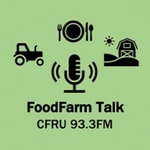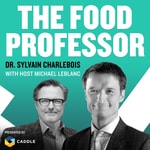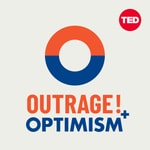Food Farm Talk – Détails, épisodes et analyse
Détails du podcast
Informations techniques et générales issues du flux RSS du podcast.

Food Farm Talk
Food Farm Talk - Hot Topics in Farming and Food
Fréquence : 1 épisode/23j. Total Éps: 87

Classements récents
Dernières positions dans les classements Apple Podcasts et Spotify.
Apple Podcasts
🇨🇦 Canada - lifeSciences
02/08/2025#38🇨🇦 Canada - lifeSciences
01/08/2025#23🇨🇦 Canada - lifeSciences
06/07/2025#95🇨🇦 Canada - lifeSciences
05/07/2025#87🇨🇦 Canada - lifeSciences
04/07/2025#81🇨🇦 Canada - lifeSciences
03/07/2025#68🇨🇦 Canada - lifeSciences
02/07/2025#58🇨🇦 Canada - lifeSciences
01/07/2025#46🇨🇦 Canada - lifeSciences
30/06/2025#34🇨🇦 Canada - lifeSciences
29/06/2025#23
Spotify
Aucun classement récent disponible
Liens partagés entre épisodes et podcasts
Liens présents dans les descriptions d'épisodes et autres podcasts les utilisant également.
See all- https://rogerlmartin.com/
33 partages
- https://farmersforclimatesolutions.ca/
17 partages
- https://www.un.org/en/food-systems-summit
15 partages
- https://twitter.com/SoilsAtGuelph
3 partages
- https://twitter.com/fortybytwenty
3 partages
- https://twitter.com/petkerfarm
2 partages
Qualité et score du flux RSS
Évaluation technique de la qualité et de la structure du flux RSS.
See allScore global : 43%
Historique des publications
Répartition mensuelle des publications d'épisodes au fil des années.
Healthy Food, Healthy Environment with ranchers Craig and Peter
mercredi 21 août 2024 • Durée 01:01:07
On this stop in the Stories of Regeneration tour, we returned to Alberta, making a stop at Peony Farms in Lacombe.
Facing his daughter’s health issues, rancher Craig Cameron and his family turned to regenerative farming to grow the healthiest food possible for her. Craig, alongside his father-in-law Peter DenOudsten, shifted their traditional beef farm to a regenerative model. They now grow over 10 types of grass and clover, use less fertilizer, and produce some of the healthiest, most nutritious beef you can find.
- 5:22 – Peter shares the history of Peony Farms.
- 6:46 – How did Peter become aware of regenerative agriculture principles and practices?
- 9:15 – Why did the farm start heading down the regenerative agriculture path?
- 15:25 – Peter and Craig talk about the regenerative practices they use on the farm.
- 22:48 – Have Peter and Craig seen benefits from implementing regenerative agriculture?
- 25:06 – What is forage-finished beef?
- 30:53 – Why raise piedmontese cattle?
- 36:35 – Peter and Craig talk about testing.
- 46:34 – What role can consumers play in supporting the adoption of regenerative agriculture?
- 51:29 – What is the regenerative mindset?
- Stories of Regeneration
- Stories of Regeneration Short Film Series
- Regeneration Canada’s Farm Map
- Peony Farms
If you want to learn more, we recommend you check out the following:
- EP 47 – The Regen Mindset
- EP 67 – Total Grazing – SoR Part 1
- EP 69 – Loyal to the Soil – SoR Part 2
- EP 70 – Maximizing Soil Function – SoR Part 3
- EP 71 – Sharing the Land – SoR Part 4
- EP 72 – Connecting People to Place – SoR Part 5
- EP 73 – Diversity is Resiliency – SoR Part 6
- EP 75 – From Pastures to Cheese – SoR Part 7
- EP 76 – Partners in the Ecosystem – SoR Part 8
Our Farmers Blog shares stories about Alberta farmers who do an exceptional job of caring for the land, producing food, and building up their communities.
This podcast has been partially funded by Agriculture and Agri-food Canada
WANT TO LEARN MORE?
Partners in the Ecosystem with Rebecca Harbut and Mike Bomford
mercredi 10 juillet 2024 • Durée 01:14:21
In this episode, we’ll be doing some exploration into the relationship between society and regenerative agriculture and how one can help advance the other. But the real meat and potatoes of the last three episodes, just like in all the other episodes in this series, will be about getting to know and understand the boots on the ground folks who are leading the way on this change that we are seeing in the agriculture sector.
Meet Rebecca Harbut and Mike Bomford from Kwantlen Polytechnic University (KPU) in Richmond, BC—prime examples of such trailblazers. Now, you might wonder, how do university professors fit the description of being ‘on the ground’? Well, let me tell you, KPU isn’t just any university; it boasts a farm that lies at the heart of Rebecca and Mike’s endeavors.
Moreover, as we’ve touched upon throughout this podcast series, with Canada’s population nearing the 40 million mark, farm and ranch operators, along with farm laborers, represent a mere fraction—around 1%—of the populace. The takeaway here? It’s going to require a collective effort, involving many of us outside the traditional farming community, to partner with that crucial 1%. This collaboration is key to expanding regenerative agriculture from a niche practice to a widespread one.
- 8:33 – Rebecca and Mike help us get to know them better.
- 15:31 – How did the land that KPU sits on get involved in agriculture?
- 27:22 – What’s taking place on the KPU farm?
- 37:14 – What regenerative practices are used on the KPU farm?
- 40:13 – Mike talks more about the farm’s crop rotation.
- 48:08 – What is the story that KPU farm is trying to tell?
- 53:31 – How hard was it for the university to take that leap into establishing an ecosystem?
- 58:45 – Why are community partners an important part of the ecosystem at the KPU farm?
- Kwantlen Polytechnic University
- Stories of Regeneration
- Stories of Regeneration Short Film Series
- Regeneration Canada’s Farm Map
If you want to learn more, we recommend you check out the following:
- EP 67 – Total Grazing – SoR Part 1
- EP 69 – Loyal to the Soil – SoR Part 2
- EP 70 – Maximizing Soil Function – SoR Part 3
- EP 71 – Sharing the Land – SoR Part 4
- EP 72 – Connecting People to Place – SoR Part 5
- EP 73 – Diversity is Resiliency – SoR Part 6
- EP 75 – From Pastures to Cheese – SoR Part 7
Our Farmers Blog shares stories about Alberta farmers who do an exceptional job of caring for the land, producing food, and building up their communities.
This podcast has been partially funded by Agriculture and Agri-food Canada
Cows, Crops, and Soil Health, with Stuart Wright, Wellington County farmer (Encore)
mercredi 23 août 2023 • Durée 29:37
Sustainable farming is about the people and organizations working daily to that end. Stuart Wright is a dairy and cash crop farmer from Kenilworth, Wellington County, and a past President of Ontario Soil and Crop Improvement Association. Both Stuart and the Soil and Crop organization work hard on farm sustainability. Stuart describes his family’s work building soil health and sustainability using crop rotation, no till, strip till, cover crops, and the 4Rs of nutrient management. Since 1939, Soil and Crop has been innovating new ways of growing crops to improve both production and conservation. Stuart’s discussion with Paul Smith illustrates the complexity of juggling crops, livestock and changing practices. He also reflects about how farmers learn from other farmers, advisors and researchers, and then try new things on their farms—illustrating the importance of the network of organizations collaborating on sustainable agriculture. (Originally aired in 2020).
More information is available at: https://www.ontariosoilcrop.org/ https://wellingtonsoilcrop.org/ https://www.ontariosoilcrop.org/association/the-soil-fixers/ https://www.farms.com/videos/rural-lifestyle/stuart-wright-138455.aspx
Guelph Centre For Urban Organic Farming with Mike Smith
mercredi 7 juin 2023 • Durée 32:46
The Guelph Centre for Urban Organic Farming at the University of Guelph is a fascinating project combining the university’s strength in food and agriculture, local food supply chains, student learning and research, student activism, and community engagement. Mike Smith, the centre’s farm coordinator, talks with us about the activities of the Guelph Centre for Urban Organic Farming.
University of Guelph is known as Canada’s Food University and it began its existence as the Ontario Agricultural College. Students can also get a certificate in organic agriculture through the university. So, it is fitting to have the Guelph Centre for Urban Organic Farming here to help in learning and research. The centre is run through the Department of Plant Agriculture within the Ontario Agricultural College and is located within the University of Guelph Arboretum. The centre also connects to Hospitality Services at the university, to the SEED, to the student food bank, and other local partners.
Students voted in a 2019 referendum to provide $1 per student per term for 10 years to support the activities of the centre, through the Central Students Association. That funding plus support from the Department of Plant Agriculture, Ontario Agricultural College, finances the current activities of the centre. Mike Smith, the farm coordinator, summer student employees, and volunteers deliver farm activities.
Student and community volunteers are an important part of centre activities and are welcome to help with seasonal activities including planting, weeding, and harvest.
More Information:
https://www.uoguelph.ca/oac/gcuof
https://csaonline.ca/elections/archive/W19-general
https://www.uoguelph.ca/oac/guelph-centre-urban-organic-farming/volunteers
Plant based diets and recipes with Katherine Eckert (Encore)
mercredi 5 avril 2023 • Durée 26:14
Recruiting Soil to Tackle Climate Change: A Roadmap for Canada
jeudi 19 janvier 2023 • Durée 29:40
"Recruiting Soil to Tackle Climate Change: A Roadmap for Canada" is a 2022 report by the Soil Conservation Council of Canada and the Compost Council of Canada aimed at helping more people put carbon into soil and keep it there.
The world’s soils have lost an estimated 133 billion tons of carbon since the beginning of agriculture 12,000 years ago. This loss represents a substantial opportunity for climate-change mitigation via carbon sequestration in soils. The challenges to building soil carbon, however, include socio-economic, political, and cultural barriers. Healthy soil microbial communities build carbon, while also generating societal benefits like clean water, but managing for soil health means adopting best-management practices (BMPs) that often run counter to perceived economic advantage and long-established cultural norms.
Soil-carbon sequestration is a “no regrets” approach, applying landscape-based solutions to climate change. It can be implemented at a relatively low cost per tonne of CO2e, and it has numerous co-benefits, such as increased fertility, cleaner water, and greater farm profitability. Moreover, the science behind these statements is not disputed. While there is some disagreement between scientists around the details, even the most conservative among researchers and academics recognize that the potential for building soil carbon levels is real and worth the investment. In fact, soil health is a topic that has been receiving a growing amount of attention worldwide over the past few years
The Soil Conservation Council of Canada and the Compost Council of Canada released the final report in April 2022. The Roadmap is a call to action and a plan for Canada to create a partnership with soil and with soil managers. And that will deliver significant benefits – for generations to come.
More information:
https://www.youtube.com/watch?v=I0orPeMZVB8
https://soilcc.ca/programs/recruiting-soil-to-tackle-climate-change/
http://www.compost.org/wp-content/uploads/2022/04/Press-Release-Recruit-Soil-to-Tackle-Climate-Change.pdf
First Nations Build Agricultural Businesses, with Cadmus Delorme
mercredi 26 octobre 2022 • Durée 29:38
Agriculture: When More Isn't Better with Roger Martin - Encore
mercredi 21 septembre 2022 • Durée 29:20
"When More Isn’t Better", thoughts from the world’s #1 management thinker, Roger L. Martin, on farm resilience, presented at the virtual Midwest Cover Crops Council Conference on February 24, 2021. Roger Martin is professor emeritus and former Dean of the Rotman School of Management at the University of Toronto. He grew up in Wallenstein, Ontario where his family was active with an agri-business in the feed industry. "There is a trade-off between efficient and effective…we’ve been pushing efficiency so hard that it is now having counterproductive impacts on life, the economy, the environment."
Following the theme of his latest book, WHEN MORE IS NOT BETTER: Overcoming America’s Obsession With Economic Efficiency, Martin participated in a keynote conversation with Mel Luymes (Principal, Headlands Ag-Enviro) to discuss the perils of obsessively pursing efficiency in agriculture, and how integrative thinking can help agriculture become more resilient.
“There is a trade-off between efficient and effective…we’ve been pushing efficiency so hard that it is now having counterproductive impacts on life, the economy, [the environment]. Pushing things to the extremes leads to extreme outcomes.”
In agriculture, our attention naturally goes to bushels per acre, feed conversion efficiency, and other efficiency measures. But other proxies – profit per acre, soil organic matter, annual soil loss – are necessary to develop a holistic picture of whether our farm enterprises are pursuing efficiency at the expense of resilience. (First aired in 2021).
More information:
https://rogerlmartin.com/
https://mccc.msu.edu/
https://soilsatguelph.ca/
Environmental Farm Plan: Ag's Best Kept Secret? - Encore
mercredi 7 septembre 2022 • Durée 29:50
The Environmental Farm Plan or EFP builds sustainability on Ontario and Canadian farms by farmers assessing their farms' environmental risks and changing practices to reduce or eliminate those risks. It began over 25 years ago in Ontario, led by farmer organizations working with governments, building consensus and changing social norms. EFP has now spread across Canada and evolved to fit each region’s needs. The evolution continues to meet changing demands. EFP may become the base for farms’ sustainability certification. An electronic version improves convenience and may appeal to younger generations. Listen to Paul Smith’s conversation with Andy Graham, Executive Director of Ontario Soil and Crop Improvement Association, and others reflecting on the history, evolution and future of the Environmental Farm Plan. (First aired in 2019).
https://www.ontariosoilcrop.org/oscia-programs/workshops-webinars/environmental-farm-plan/
http://www.omafra.gov.on.ca/english/environment/efp/efp.htm
https://ccsenet.org/journal/index.php/sar/article/view/0/43433
Sustainable Fertilizer Use in Agriculture – the Environment - Encore
mercredi 17 août 2022 • Durée 29:10
Fertilizer is fundamental to agriculture and key to feeding all us, but excess nitrogen and phosphorus have unintended effects on soil ecosystems, water quality, and greenhouse gas emissions. This episode explores how the 4R Nutrient Stewardship program brings together research, agronomy, environmental science, and education to help farmers plan fertilizer use to conserve the environment while growing their crops. 4Rs practices can reduce phosphorus contributing to excessive algal growth and eutrophication, as well as reduce conversion of nitrogen to the greenhouse gas nitrous oxide. Extensive research is needed to define and support these practices. McKenzie Smith, Director, Stewardship and Regulatory Affairs at Fertilizer Canada in Ottawa and Nicole Penney of FS PARTNERS out of Guelph help us explore this topic. This second part of a two-part exploration of the 4Rs delves into the science, environmental aspects and related research on the 4Rs system. (First aired in 2020).
More information:
https://fertilizercanada.ca/nutrient-stewardship/
https://nutrientstewardship.org/








